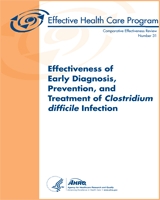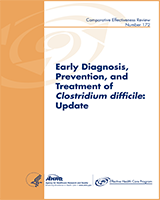NCBI Bookshelf. A service of the National Library of Medicine, National Institutes of Health.
Butler M, Bliss D, Drekonja D, et al. Effectiveness of Early Diagnosis, Prevention, and Treatment of Clostridium difficile Infection [Internet]. Rockville (MD): Agency for Healthcare Research and Quality (US); 2011 Dec. (Comparative Effectiveness Reviews, No. 31.)
This publication is provided for historical reference only and the information may be out of date.

Effectiveness of Early Diagnosis, Prevention, and Treatment of Clostridium difficile Infection [Internet].
Show details- CDI
C. difficile infection.
- Colonization
C. difficile becomes established in the intestine. Technically, colonized individuals may or may not have CDI, since an individual with an infection is necessarily colonized by the organism. However, the term is often used in the literature to denote asymptomatic colonization.
- False Negative Fraction
Fraction of tested stool specimens that had a positive reference test and a negative result for the diagnostic method being evaluated. The false negative fraction is equal to one minus the sensitivity.
- False Positive Fraction
Fraction of tested stool specimens that had a negative reference test and a positive result for the diagnostic method being evaluated. The false positive fraction is equal to one minus the specificity.
- Gene Detection Test
Methods of amplifying (replicating) specific parts of genetic material (DNA) in samples usually using the polymerase chain reaction (PCR) followed by detection of the highly replicated gene fragment.
- Hypersporulation
Accelerated rate of spore production.
- Hypervirulent
Strains of CDI that include increased toxin production, an additional binary toxin, hypersporulation, and high-level resistance to fluoroquinolone antibiotics.27
- Immunoassay
Test that is based on interactions between added animal antibodies against the specific substance to be detected, e.g. C. difficile toxins or glutamate dehydrogenase. Different tests use varying methods to isolate and detect the antibody/antigen complexes formed in the specimen being tested. Commonly referred to as enzyme immunoassay (EIA) in the literature.
- Negative Predictive Value
Fraction of tested stool specimens that were negative for the diagnostic method being evaluated and negative on the reference test. Depends on the prevalence of toxigenic C. difficile in the tested specimens.
- Nonstandard Therapy
Therapies other than treatment with antibiotics for CDI, such as probiotics, prebiotics, monoclonal antibodies, and fecal flora reconstitution.
- Positive Predictive Value
Fraction of tested stool specimens that were positive for the diagnostic method being evaluated and positive on the reference test. Depends on the prevalence of toxigenic C. difficile in the tested specimens.
- Prebiotics
Nondigestible foods that create environments healthy for bacteria growth.
- Probiotics
Living microorganisms, including bacteria or yeast, which are believed to restore microbial balance to gastrointestinal flora when administered in adequate amounts.
- Recurrent CDI
Recurrence of symptoms within 8 to 10 weeks after cessation of specific antibiotic therapy, with exclusion of other enteropathogens and a positive diagnostic test for toxigenic C. difficile.119
- Sensitivity
Fraction of tested stool specimens that had a positive reference test and a positive result for the diagnostic method being evaluated. Sensitivity is also called the true positive fraction.
- Severe CDI
Definitions vary in the literature, but generally refer to a CDI diagnosis in combination with more complex manifestations of disease or in patients with other significant risk-factors such as age, signs of infections, or comorbidities.
- Specificity
Fraction of tested stool specimens that had a negative reference test and a negative result for the diagnostic method being evaluated. Specificity is also called the true negative fraction.
- Discussion - The Clinical Utility of Fractional Exhaled Nitric Oxide (FeNO) in A...Discussion - The Clinical Utility of Fractional Exhaled Nitric Oxide (FeNO) in Asthma Management
- Glossary of Terms - Effectiveness of Early Diagnosis, Prevention, and Treatment ...Glossary of Terms - Effectiveness of Early Diagnosis, Prevention, and Treatment of Clostridium difficile Infection
- Glossary and List of Definitions - The Role of Immunotherapy in the Treatment of...Glossary and List of Definitions - The Role of Immunotherapy in the Treatment of Asthma
- Peer Reviewers - Impact of Healthcare Algorithms on Racial and Ethnic Disparitie...Peer Reviewers - Impact of Healthcare Algorithms on Racial and Ethnic Disparities in Health and Healthcare
- Methods - Pain Management Interventions for Hip FractureMethods - Pain Management Interventions for Hip Fracture
Your browsing activity is empty.
Activity recording is turned off.
See more...
